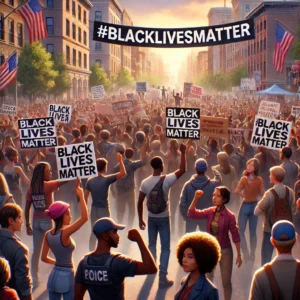 The hashtag #BlackLivesMatter first emerged on July 13, 2013, in reaction to the acquittal of George Zimmerman, who had been charged with the fatal shooting of African-American teenager Trayvon Martin. This powerful phrase was coined by activists Alicia Garza, Patrisse Cullors, and Opal Tometi, who aimed to bring attention to the persistent issues of systemic racism and violence against Black individuals. The hashtag quickly gained traction on social media, resonating with countless individuals who felt a deep sense of injustice and frustration over the verdict. This digital rallying cry marked the beginning of what would become a global movement dedicated to challenging racial inequality and advocating for the rights and dignity of Black lives.
The hashtag #BlackLivesMatter first emerged on July 13, 2013, in reaction to the acquittal of George Zimmerman, who had been charged with the fatal shooting of African-American teenager Trayvon Martin. This powerful phrase was coined by activists Alicia Garza, Patrisse Cullors, and Opal Tometi, who aimed to bring attention to the persistent issues of systemic racism and violence against Black individuals. The hashtag quickly gained traction on social media, resonating with countless individuals who felt a deep sense of injustice and frustration over the verdict. This digital rallying cry marked the beginning of what would become a global movement dedicated to challenging racial inequality and advocating for the rights and dignity of Black lives.
As the Black Lives Matter movement grew, it organized and participated in numerous protests and demonstrations across the United States and around the world. These actions highlighted a range of issues, from police brutality and mass incarceration to economic disparity and political disenfranchisement. The movement’s influence extended beyond street protests, as it fostered widespread public discourse and prompted many to reconsider and address the deeply rooted racial biases within society. The use of social media played a crucial role in mobilizing supporters, sharing information, and documenting instances of racial injustice, thereby amplifying the movement’s reach and impact.
Over the years, Black Lives Matter has become a critical catalyst for discussions on racial justice, police reform, and broader social inequalities. The movement has inspired legislative efforts, influenced political platforms, and brought about tangible changes in various institutions. It has also faced significant challenges and opposition, underscoring the enduring resistance to addressing systemic racism. Nonetheless, the resilience and perseverance of Black Lives Matter activists have kept the issues at the forefront of public consciousness. Today, Black Lives Matter remains a vital force in the ongoing struggle for equity and justice, continuing to advocate for the transformation of systems that perpetuate racial disparities and for the affirmation of Black lives everywhere.
